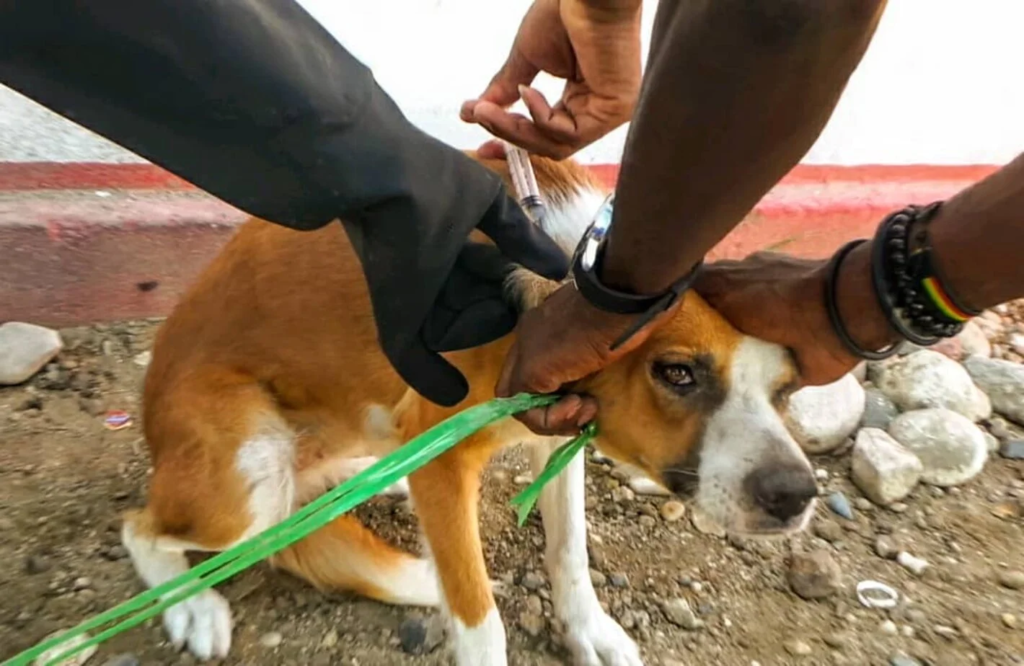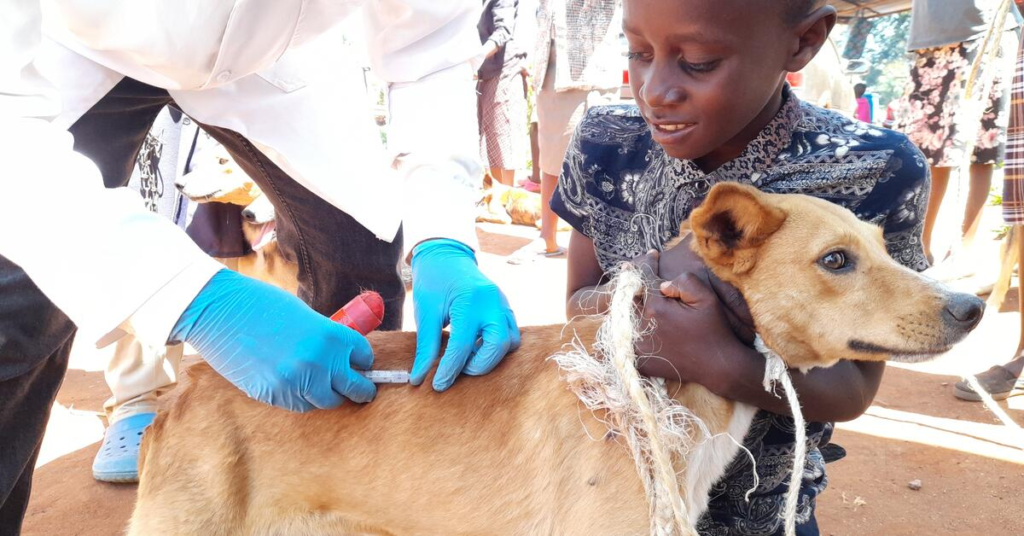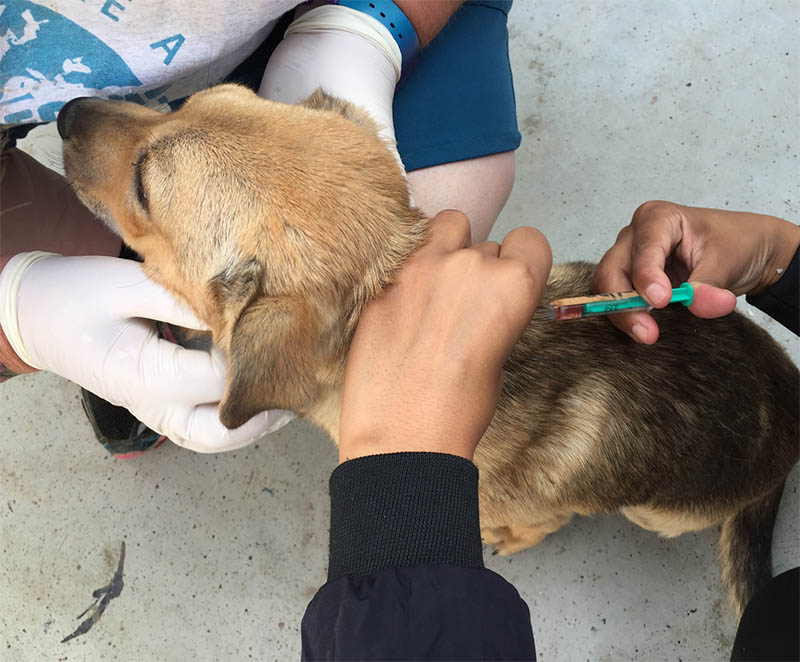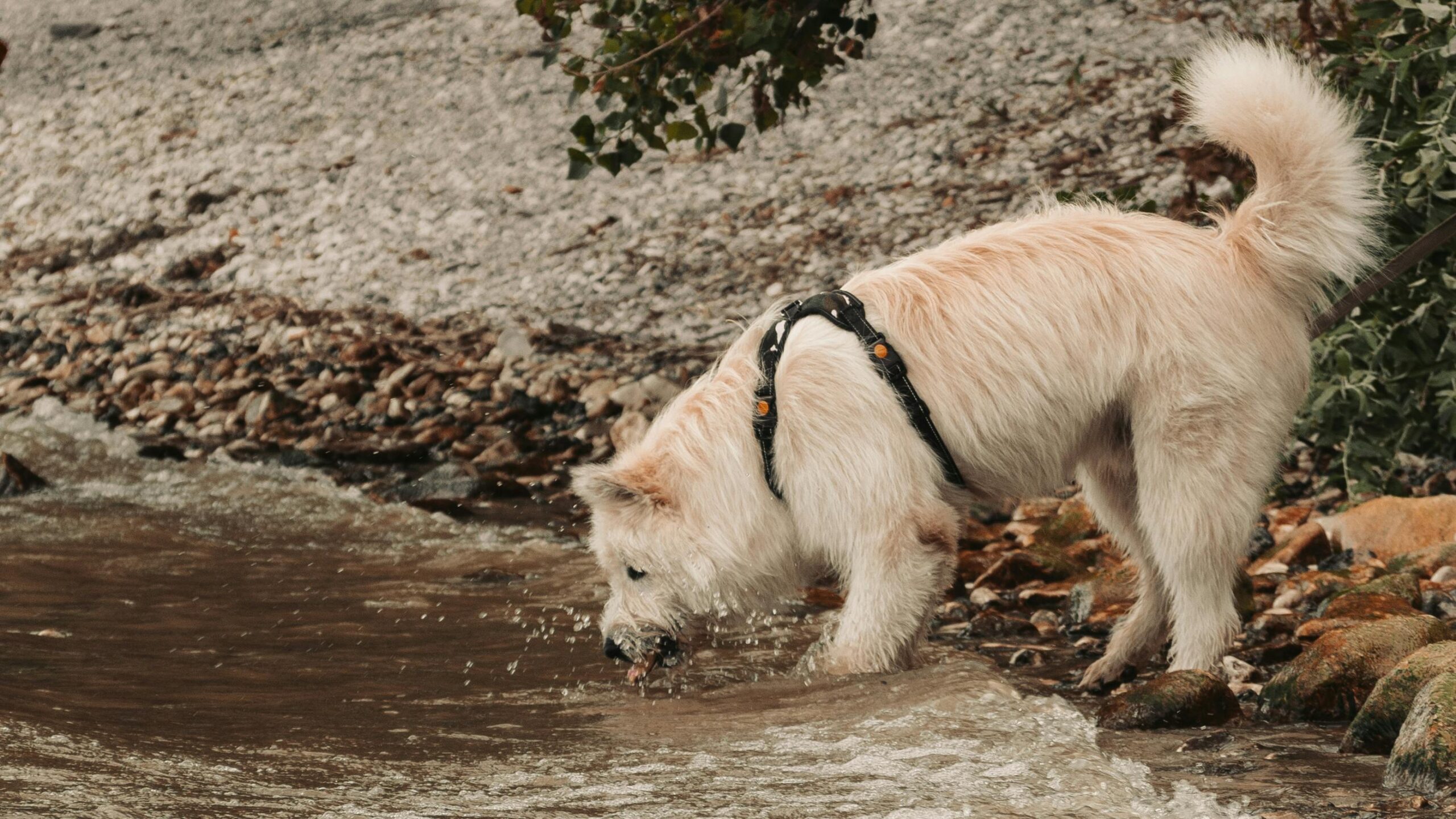How much is a rabies vaccine for dogs Exploring the great outdoors with your furry friend is an enriching experience, but it’s essential to prioritize their safety. One vital aspect of canine health care is ensuring they receive the rabies vaccine.
Rabies is a lethal viral disease that impacts the nervous system of mammals, including dogs and humans. The primary mode of transmission is through the bite of an infected animal, often via saliva. Given its contagious nature and potentially fatal consequences if untreated, vaccination against rabies is imperative to protect your beloved pet’s health and longevity.
What Is Rabies And Why Is Rabies Vaccine Important?
Rabies is a viral infection that affects the nervous system of mammals, including our cherished canine companions. As a zoonotic disease, it has the potential to transmit from animals to humans, posing a significant public health risk.
How Is Rabies Transmitted?
- The rabies virus primarily spreads through the bite of an infected animal, as it resides in their saliva.
- Contact with other bodily fluids like blood or tissues can also result in infection if they come into contact with open wounds or mucous membranes.
Why Is Vaccination Important For Dogs?
Immunizing your furry friend against rabies isn’t just prudent – it’s a vital life-saving measure. Not only does it shield your pup from this lethal illness, but it also curbs the transmission of rabies to humans and other animals in your vicinity. Consider it akin to donning a superhero cape for your beloved canine companion!
The Rabies Vaccine: Your Dog’s Saviour Against Rabies
What Is The Rabies Vaccine?
The rabies vaccine for dogs is a formidable tool in combatting this lethal virus. It operates by triggering your pet’s immune system to generate antibodies capable of neutralizing the rabies virus upon exposure. It’s akin to empowering your furry friend with superhero-like immunity!
There Are Two Main Types Of Rabies Vaccines For Dogs:
- Killed Virus Vaccines : The rabies vaccines harbor deactivated, non-infectious versions of the rabies virus. While generally safe for most dogs, some may need more frequent boosters to ensure sustained protection.
- Modified Live Virus Vaccines: These vaccines utilize a weakened, attenuated form of the rabies virus that cannot induce the disease in healthy animals. They often offer extended immunity, although they might not be appropriate for dogs with weakened immune systems.
What Is The Rabies Vaccination Schedule For Dogs?
Ensuring your furry sidekick receives the rabies vaccine according to the recommended schedule is paramount for providing maximum protection against this lethal foe.
When Should Puppies Receive Their First Rabies Vaccine?
Puppy power kicks in early! Young crime-fighting companions should get their first dose of the rabies vaccine around 12-16 weeks of age, followed by a booster shot one year later. This initial series lays the groundwork for robust immunity.
How Often Should Adult Dogs Be Vaccinated?
Once your dog has unlocked their puppy powers, they’ll need regular boosters to keep their rabies-fighting skills sharp. Adult dogs should get an anti-rabies vaccine every one to three years, based on the vaccine type and local rules. Your reliable vet can help you tailor the perfect schedule for your pet.
Are There Any Exceptions Or Special Circumstances For The Rabies Vaccine?
Dogs living in rural areas or those with higher exposure to wildlife might need more frequent boosters. Specific states or countries may also have unique requirements for the anti-rabies vaccine schedule for dogs, so it’s vital to consult with your local veterinarian.
Rabies Vaccine Safety And Side Effects: Keeping Your Superhero Safe
Though the cost of the rabies vaccine for dogs is usually reasonable, prioritizing your pet’s safety during and after vaccination is paramount.
Common side effects of the rabies vaccine are typically mild and temporary, akin to post-battle fatigue. These may manifest as lethargy, decreased appetite, mild fever, or soreness at the injection site. Most dogs bounce back from these effects within a day or two without any lasting repercussions.
However, in rare instances, more severe reactions can occur.
How To Recognize An Adverse Reaction To The Rabies Vaccine?
- If you notice any concerning symptoms such as vomiting, diarrhea, difficulty breathing, swelling of the face or neck, or collapse, it’s crucial to act swiftly. Contact your veterinarian immediately for prompt medical attention and guidance on how to proceed.
- It’s worth noting that the rabies vaccine for dogs is specifically designed for animals and cannot induce side effects in humans. Nonetheless, if accidental exposure occurs, it’s advisable to seek medical advice as a precautionary measure.
Conclusion
Ensuring your furry friend is safeguarded against the lethal rabies virus isn’t just a legal obligation in many regions; it’s also a conscientious decision for their welfare and that of your family and community. By staying current on the anti-rabies vaccine for dogs and adhering to the suggested vaccination timetable, you can have peace of mind knowing your furry superhero remains healthy and secure.
Keep in mind that rabies is a preventable illness, but once clinical signs manifest, it’s inevitably fatal. Don’t allow this adversary to overcome your pup – vaccinate and demonstrate responsible pet ownership!
How Long Is A Rabies Vaccine Good For In A Dog?
The protective duration of the rabies vaccine for dogs can fluctuate based on the vaccine type. Killed virus vaccines typically safeguard for about 1 year, whereas modified live virus vaccines can extend immunity for up to 3 years. Nevertheless, it’s crucial to adhere to your vet’s advice and adhere to local regulations regarding booster schedules.

When Should A Dog Get A Rabies Vaccine?
At approximately 12-16 weeks of age, puppies should get their first rabies vaccine dose, followed by a booster shot one year later. This initial series is crucial for building a robust immunity against the rabies virus.
How Many Doses Of Rabies Vaccine For Dogs?
The number of doses needed for the rabies vaccine in dogs can vary. Puppies usually require an initial series of two doses, administered around 12-16 weeks of age, followed by a booster shot one year later. For adult dogs, a single booster dose is typically necessary every 1-3 years, depending on the type of vaccine used and local regulations.
How Often Do Dogs Get Rabies Shots?
The frequency of rabies shots for dogs varies based on the vaccine type and local regulations. Typically, adult dogs require a rabies booster shot every 1-3 years following the initial puppy series. However, specific regions may mandate annual boosters, so consulting your veterinarian for the appropriate schedule is advisable.
Is A Rabies Booster Necessary For Dogs?
Absolutely, rabies boosters are essential for dogs to sustain sufficient protection against the rabies virus. The immunity acquired from the initial puppy series of vaccines may diminish over time, underscoring the importance of regular booster shots to keep your canine companion safeguarded.
Is Rabies Yearly For Dogs?
The frequency of rabies vaccination for dogs can indeed vary. While certain regions mandate annual rabies boosters, others adhere to a schedule of every 1-3 years, contingent upon the vaccine type and local regulations.
It’s crucial to confer with your veterinarian and adhere to the prescribed schedule applicable to your area to uphold your dog’s defense against this perilous disease.
What Is The Rabies Vaccine Cost For Dogs?
The cost of the rabies vaccine for dogs in India can fluctuate based on factors such as the geographical area, the type of veterinary facility, and any additional services included in the package.
Typically, a single dose of the rabies vaccine can range from approximately 200 to 800 rupees at most animal hospitals and veterinary clinics in India. Private clinics may charge slightly higher, around 500 to 1200 rupees per dose.
NGOs and Municipal Corporations frequently organize rabies vaccination camps for dogs, offering subsidized rates ranging from around 100 to 300 rupees.
Can A Vaccinated Dog Get Rabies?
Although extremely rare, it’s theoretically possible for a vaccinated dog to contract rabies in India. However, the rabies vaccine drastically reduces this risk and offers vital protection for your furry friend.
In the event of exposure to the rabies virus, the vaccine prompts the dog’s immune system to generate antibodies, which can effectively combat the virus before it leads to any symptoms or disease. This underscores the importance of vaccinating your dog against rabies and adhering to recommended vaccination schedules to safeguard their health.

Why is it important for pets to get the ARV shot?
Every year, countless animals succumb to the devastating effects of the rabies virus, which is universally fatal and currently lacks any known cure. The virus spreads from wild animals to domestic pets and ultimately to humans, posing a significant risk to both pets and people, whether knowingly or unknowingly. Moreover, the potential for pets or stray animals to transmit the virus to others is equally substantial.
Given the absence of effective treatments, the most crucial step in preventing rabies is vaccination, which is essential for both pets and humans. To ensure comprehensive protection, the anti-rabies vaccine should also be administered to community dogs and cats.
At Team Wiggles, we’ve initiated the #BondedByBlood campaign to establish an online repository of willing pet blood donors. By registering your pet, you can contribute to saving lives in the future. Join us in this noble cause by registering your pet today: [link].
*Disclaimer: This blog has been vet-approved and contains original content meticulously researched and authenticated by our team of in-house veterinarians and content experts. It’s always advisable to seek advice from a veterinarian before attempting any products, pet food, or treatments/medications on your pets, as each pet is unique and may respond differently.
Rabies 101
Rabies stands as a formidable threat, impacting the central nervous system of mammals, including both humans and our beloved canine companions.
Attributed to the rabies virus, a member of the Lyssavirus genus, this disease chiefly spreads through the saliva of an infected mammal, typically transmitted via bites. Once contracted, the virus takes aim at the central nervous system, inducing severe inflammation of the brain. This dire assault culminates in the demise of the infected individual within mere days or weeks of the onset of clinical manifestations.
However, discerning signs of rabies infection can prove challenging, as the onset of clinical symptoms may vary widely and may not become apparent for an extended period. This complexity underscores the utmost importance of identifying and promptly addressing mammals suspected of harboring the rabies virus.
How does the rabies vaccine for dogs work
Administering the rabies vaccine stands as the paramount method for thwarting rabies in dogs. This crucial preventive measure not only shields our furry companions but also bolsters public health by curbing the risk of rabies exposure to humans via animal bites.
The rabies vaccine operates by prompting the dog’s immune system to generate protective antibodies against the rabies virus. In the event of viral exposure, these antibodies swiftly spring into action, neutralizing the virus and halting its propagation, thus forestalling the onset of the disease. Through widespread vaccination initiatives targeting domestic animals like dogs, we fortify our defenses against rabies transmission from wildlife reservoirs, including raccoons, bats, and skunks.
Veterinary surgeon Dr. Linda Simon underscores the indispensable role of the rabies vaccine:
The rabies vaccine is compulsory in certain locales, serving to shield both the canine populace and humans. Rabies is a zoonotic disease with fatal consequences for both humans and animals. Ensuring widespread vaccination coverage is our best strategy for eradicating this disease once and for all.
Benefits of the rabies vaccine for dogs
By administering rabies vaccinations to dogs, we’re not just safeguarding our beloved pets, but we’re also actively bolstering public health efforts. These vaccinations play a crucial role in curbing the spread of rabies among animals, thereby mitigating potential threats to both animal and human populations. Through proactive vaccination campaigns, we’re effectively reducing the likelihood of transmission, fostering safer environments for communities and their furry companions alike.

Timing of the rabies vaccine
Following the recommended vaccination protocol is essential for ensuring the health and safety of our furry companions. Puppies should ideally receive their first rabies vaccination between 12 to 16 weeks of age, a critical period when their immune systems are developing. This timing not only ensures an optimal immune response but also minimizes the potential interference from maternal antibodies.
After the initial vaccination, a booster shot is typically advised within a year to bolster immunity. Subsequent booster vaccinations are tailored based on local regulations and the vaccine utilized. The USDA provides comprehensive guidelines, suggesting revaccination every one to three years. However, specific state requirements may vary, underscoring the importance of consulting both local regulations and a trusted veterinarian for precise guidance on maintaining vaccination schedules.
Rabies vaccine side effects
While the rabies vaccine is widely regarded as safe for dogs, like any medical procedure, it carries potential side effects. It’s crucial to emphasize that severe reactions to the rabies vaccine are exceedingly rare, and the undeniable benefits of vaccination far outweigh any associated risks. Mild reactions are more typical, though severe allergic responses or even anaphylaxis can occur in isolated instances. Nevertheless, the overall safety profile of the rabies vaccine underscores its critical role in safeguarding the health and well-being of our canine companions.
Mild reactions:
After receiving a rabies vaccine, it’s possible for some dogs to exhibit mild reactions, which may manifest as:
- Soreness at the injection site
- Lethargy
- Mild fever
These reactions are generally transient and resolve on their own without intervention. While they may cause temporary discomfort, it’s essential to remember that they are typically short-lived and pose minimal risk to the overall health of the dog. Monitoring your pet closely and providing comfort during this period can help alleviate any discomfort they may experience.
Allergic reactions:
While allergic reactions to the rabies vaccine are rare occurrences, they are not impossible. Should you observe any of the following symptoms in your dog post-vaccination, prompt veterinary attention is imperative:
- Facial swelling
- Hives
- Itching
- Difficulty breathing
Although these reactions are infrequent, swift action ensures the well-being of your pet. Vigilance and proactive veterinary care are paramount in addressing any potential allergic responses.
Anaphylaxis:
While anaphylaxis is an exceptionally rare occurrence, it’s crucial to recognize its severity and potential threat to your dog’s health. If you suspect anaphylaxis within minutes or up to 48 hours post-vaccination, swift veterinary intervention is imperative.
Symptoms of anaphylaxis may encompass:
- Facial swelling
- Difficulty breathing
- Rapid heartbeat
- Weakness
- Collapse
- Shock
Regular monitoring of your dog post-vaccination is essential, and any concerning symptoms should prompt immediate communication with your veterinarian. They can offer guidance, address your concerns, and provide the necessary care to ensure your pet’s well-being.




